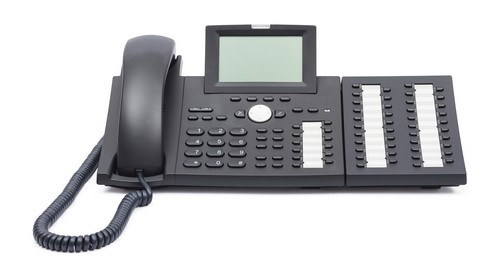Businesses are racing to reap the benefits of VoIP (Voice over IP) telecommunication systems. Simply put, VoIP is technology for phoning over the Internet, and getting on board can mean dramatic cost savings, big gains in flexibility and advanced features.

How does VoIP Work?
Voice signals are compressed and the data is divided into digital packets, which are then transmitted over Internet Protocol (IP) networks such as the Internet or a company’s own internal network. From the user’s perspective, it works very much like a conventional phone system. Calls can be made using computers with microphones or headsets, from special internet phones, or even from a normal phones equipped with adapters.
The History of VoIP.
VoIP methodology itself is not new. Engineers working on the internet progenitor, Arpanet, developed an early iteration, Network Voice Protocol (NVP), back in 1973. The first VoIP application, called Speak Freely, saw a public domain release in 1991. MTALK, a freeware VoIP application for Linux, followed in 1994, and in 1995, a company called VocalTec released Internet Phone, the first commercial VoIP software. But it wasn’t until 2004 with the introduction of mass-market services that took advantage of existing broadband networks, that VoIP took off in the consumer market. Voice over IP has since evolved rapidly into a sophisticated, feature-rich group of technologies tailored to business needs.
Wikipedia contains some fantastic informaiton about VoIP – http://en.wikipedia.org/wiki/Voip
The Advantages of VoIP Systems.
The business telecommunications landscape is being completely transformed by VoIP. By migrating to VoIP, small businesses can expect a whole range of benefits.
Reduced rates. VoIP systems reduce costs through lower monthly fees, cheaper long distance and international rates, and free calls to others within the same provider network. Calls between employees are free, no matter their location.
Simplicity. A traditional Key System Unit (KSU) for small businesses, or a PBX, or Private Branch Exchange, for larger operations, has always represented a large investment, whether setting up from scratch for a new business or expanding an existing system. A basic VoIP can, on the other hand, present few or no costs in terms of equipment. A more comprehensive VoIP system to suit the needs of a larger company often entails more substantial costs to establish; comparable to a legacy system, but feature rich in comparison.
Advanced Features: In addition to the businesses basics expected in all telecommunications systems – conference calling, voicemail, and caller ID – VoIP systems can provide a wide range of valuable extras at low cost, including:
– Virtual receptionists and greeting functions – Customisable advanced call screening and forwarding rules – Rich-media conferencing capabilities with data, voice and video – Find me / follow me functions to route calls and messages through different applications – Call queuing for peak traffic periods
The Limitations of VoIP.
There are, however, several significant drawbacks to using VoIP that are particularly worth noting when implementing a VoIP-exclusive system. The first is reliability. If your Internet service or your power goes down, so does your business’ telecommunications system. Second, because the system relies on the Internet or an internal network, the call quality will suffer if the network quality is compromised. An overloaded network may mean poor audio quality or even dropouts.
Security issues are another concern when using VoIP. Because VoIP uses packet switching technology, it is vulnerable to all threats of the internet and personal computing. Unsecured VoIP services can pose a genuine risk in terms of privacy and authentication issues and businesses are urged to take the same precautions with VoIP services as are routinely applied to data protection.
Different Types of VoIP Solutions.
There are basically two options for VoIP services for businesses, a hosted system and an on-site, managed system. Small businesses typically opt for hosted systems, which are usually cloud based. Medium to large businesses tend to go with on-site systems, which do not rely on cloud technology and offer greater flexibility and security.
Choosing a Provider
Reliability is the number one issue to look at when choosing a provider. A flagship company can provide quality service and is less likely to disappear. Contract details are also very important: support services, extra charges, and conditions for cancellation are areas to check thoroughly – hidden charges abound and licensing fine print can lock businesses in. A good provider should offer solutions tailored to individual business needs.
There are dedicated providers that supply nothing but communications solutions, and there are other vendors such as IT Support companies and Cloud-hosting organisaitons that usually resell existing white label services. IT vendors are a good option, especially if they already supply your IT Services and you have a good working relationship with them. Various technology options.
Option 1 Hosted VoIP.
A hosted service means the equipment and management of the system is hosted at an off-site data centre by a VoIP service provider. The system is ‘outsourced’ to a provider, just as conventional telephone systems are. A hosted system eliminates the need for in-house expertise for design, deployment and maintenance. Many, but not all, hosted VoIP services are cloud based systems. While a hosted service is the more expensive of the two options, it saves time and reduces headaches by providing broader customer service and reliable call quality. A hosted IP phone system is a good option for small sites that don’t have an existing key or PBX system.
Option 2 – Business Managed VoIP.
Option 2, business managed or on-site VoIP requires the purchase of software and equipment, and using an Internet provider to supply a connection. Self-hosted VoIP solutions, where the infrastructure and hardware are kept on-site, do not typically utilise cloud technology. This option represents a cost saving, but demands sufficient technical know how to set up and maintain. Management can also be outsourced to a third party at extra cost. Managed systems can often incorporate hybrid systems, a combination of traditional and internet telephony, and offer excellent scalability, customization and increased security.
Conclusions.
Making the jump to VoIP offers big rewards for businesses: lower costs, greater flexibility and improved features. The question is not whether or not to make the leap, but rather which system to choose based on the needs of the business, and which provider to select based on reliability and services offered.
Featured images:
License: Image author owned
License: Image author owned
David is currently taking a year out from his existing job in IT. Davidf lovesw to write about anything technology related.







